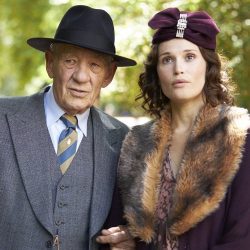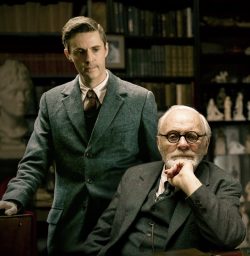 IF you are a fan of Ian McKellen – and surely most of us are, who admire great acting and infinite versatility – you will probably enjoy The Critic, Moviola’s most screened film for February in our region.
IF you are a fan of Ian McKellen – and surely most of us are, who admire great acting and infinite versatility – you will probably enjoy The Critic, Moviola’s most screened film for February in our region.
It’s a good, old-fashioned melodrama, a period thriller with some colourful characters, a slightly creaking and at times implausible plot, but some terrific performances and it passes a couple of hours quite happily.
Hats off, first, not to McKellen, who is his usual incomparable self, or Gemma Arterton, playing the unfortunate femme who is all too fatale, but to Mark Strong, cast quite against his general powerful type. Strong plays Viscount Brooke, the newspaper owner who is in love with Arterton’s character, actress Nina Land, and who is blackmailed by McKellen’s critic, Jimmy Erskine. Strong was largely neglected by the critics (what do they know!), but it is a delight to see this very intelligent actor playing a sensitive man who becomes a hapless pawn in the machinations of a clever and ruthless man.
The Critic is directed by Anand Tucker and written by Patrick Marber, based on the 2015 novel Curtain Call by Anthony Quinn. It is set in 1934 in London, where Viscount David Brooke has just succeeded his father as proprietor of the tabloid newspaper, The Daily Chronicle, for which Jimmy Erskine is the feared theatre critic. Erskine, a closet homosexual whose secretary is also his lover, delights in writing excoriating reviews of plays and performances that fall short of his high standards.
After Erskine and his secretary are arrested for homosexuality, Brooke dismisses him, along with other older employees. Erskine plots his revenge by persuading Nina Land (Gemma Arterton), into a Faustian plot in which she will seduce Brooke, who is already in love with her, in return for future glowing reviews.
 The Critic os being shown at Beaminster (Public Hall), Codford (Woolstore Theatre), Hanging Langford, Chilthorne Domer, Shrewton, Norton sub Hamdon, Winsford, Bransgore, Kilmington community cinema (East Devon), Donned St Mary, Nether Wallop, Pewsey (Bouverie Hall), Shepton Montague, Leigh (near Sherborne), Motcombe, Chidden & West M onkton, Ditcheat (Jubilee hall), Edington (Somerset), Winterslow, Ringwood (Greyfriars) 2.30, Bishopstone (Salisbury), East Stour, South Petherton (David Hall), Westbury-sub-Mendip and Royal Wootton Bassett (RWB Academy).
The Critic os being shown at Beaminster (Public Hall), Codford (Woolstore Theatre), Hanging Langford, Chilthorne Domer, Shrewton, Norton sub Hamdon, Winsford, Bransgore, Kilmington community cinema (East Devon), Donned St Mary, Nether Wallop, Pewsey (Bouverie Hall), Shepton Montague, Leigh (near Sherborne), Motcombe, Chidden & West M onkton, Ditcheat (Jubilee hall), Edington (Somerset), Winterslow, Ringwood (Greyfriars) 2.30, Bishopstone (Salisbury), East Stour, South Petherton (David Hall), Westbury-sub-Mendip and Royal Wootton Bassett (RWB Academy).
For dates and venues see the Arts Diary; for more details of the film or timings, visit www.moviola.org
A new film which has had few screenings in major cinema chains,
Freud’s Last Session is being shown by Moviola at Kingsbury Episcopi, Charlton Marshall, Norton St Philip and Watchet (cinema).
This film imagines a meeting between the dying Sigmund Freud and the young Oxford academic and theologian CS Lewis (of Narnia fame). It is, by definition, a wordy film, and may be too ascetic and philosophical for many film-goers. It got mixed reviews, but it is a fascinating portrait of a great man at the end of his life and a remarkable writer in his early years, disagreeing profoundly about questions of faith or even the existence of a divine entity, but finding common ground in humanity.
Freud’s Last Session is based on the stage play of the same name by Mark St Germain, which itself is based upon the book The Question of God, by Armand Nicholi. The film was directed by Matthew Brown and written by St Germain.
Two days after the start of the Second World War, the meeting between the two men takes place at the home of Sigmund Freud, played by Anthony Hopkins, who is suffering, agonisingly, from oral cancer. World War II. He and “Jack” Lewis (Matthew Goode) debate the existence of God, as Freud greatly resents Lewis’s recent rejection of his own strain of atheism in favour of Christianity.
The two men discuss issues such as Lewis’s lasting post-First World War trauma (what we now know as PTSD), the group of writers including Lewis and JRR Tolkien, who were known as the Inklings, and the nature of Freud’s and Lewis’s relationships with other people. This includes Freud’s difficult and co-dependent relationship with his daughter Anna, who eventually introduces her lesbian lover, Dorothy Burlingham, to him.
Freud died by suicide several weeks later due to the intense pain from the cancer. Lewis’s Narnia series was inspired by the children he took in as evacuees during the war. Anna and Dorothy lived together for decades, and Anna became known as the founder of child psychology.
The film notes that Freud met with an unidentified Oxford don in the last days of his life – who could possibly have been Lewis.
The other February films with Moviola are:
Thelma, at Yetminster (Jubilee hall), Churchinford, Highcliffe (community centre), Chard (Guildhall), Kingston St Mary, East Knoyle, Mere and West Camel;
Paddington in Peru at Castle Cary (Caryford community hall);
Twisters at Fawley (Jubilee hall);
Firebrand at Calne;
The Outrun – Wookey Hole, Odcombe, Watchet (cinema), Sixpenny Handley and South Petherton (David Hall);
and My Favourite Cake at Trent.
Pictured: Scenes from The Critic and Freud’s Last Session.